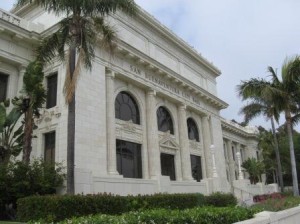 Courthouse News Service won a ruling in the Ninth Circuit recently for access to court filings. CNS went to federal court last year to challenge the Ventura County Superior Court policy of delaying the release of court opinions. A U.S. district court judge dismissed the case, finding that it was not a First Amendment issue, but a claim that involved sensitive state information, and that the federal court should abstain. The Ninth Circuit overturned that ruling and remanded the case to the federal district court for a decision on the merits.
Courthouse News Service won a ruling in the Ninth Circuit recently for access to court filings. CNS went to federal court last year to challenge the Ventura County Superior Court policy of delaying the release of court opinions. A U.S. district court judge dismissed the case, finding that it was not a First Amendment issue, but a claim that involved sensitive state information, and that the federal court should abstain. The Ninth Circuit overturned that ruling and remanded the case to the federal district court for a decision on the merits.
Courthouse News Service is a periodical that covers courthouses all over the United States. They send reporters into courts every day to review the filings and write about the newsworthy cases. Most courts in California allow reporters daily access to the filings, but Ventura County has a policy that delays reporter access until “official processing” is completed, at which point the cases are no longer breaking news.
The Ninth Circuit found a clear First Amendment interest in immediate reporter access to the opinions. In the opinion, Judge Wardlaw wrote, “CNS’s First Amendment right of access claim falls within the general rule against abstaining under Pullman in First Amendment cases. CNS’s right of access claim implicates the same fundamental First Amendment interests as a free expression claim, and it equally commands the respect and attention of the federal courts.” We have the featured the trial and appellate court filings on Justia Dockets. You can read the full opinion and summary on Justia, as well.

 Delaware Courts of Chancery appealed to the U.S. Supreme Court recently, seeking to validate a law that would allow them to hold confidential arbitration proceedings for parties with $1M litigation at stake.
Delaware Courts of Chancery appealed to the U.S. Supreme Court recently, seeking to validate a law that would allow them to hold confidential arbitration proceedings for parties with $1M litigation at stake.